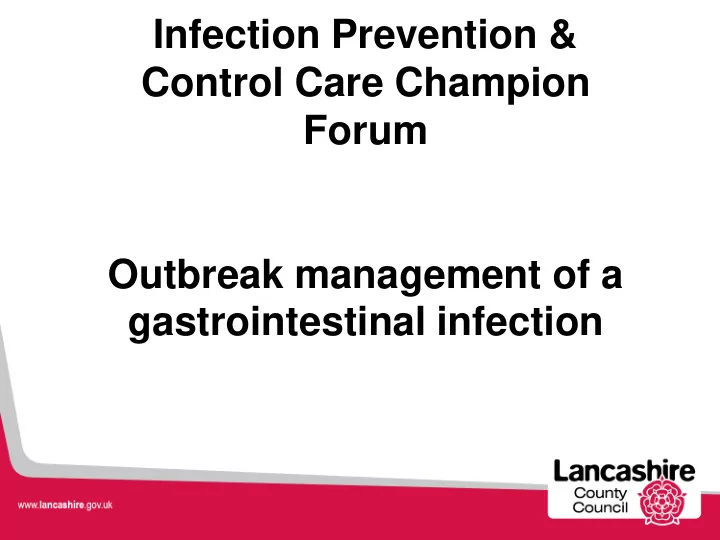

Infection Prevention & Control Care Champion Forum Outbreak management of a gastrointestinal infection
Housekeeping Fire exit & test alarm Toilets Refreshments
Scenario • Mrs Smith a resident goes to the communal dining area for her breakfast she begins to feel unwell and projectile vomits on the carpet. She returns to her room complaining of feeling nauseous and has several episodes of diarrhoea and vomiting throughout the day. • By evening two more residents who were in the dining room at the time begin to have symptoms. • Mrs Smith tells the carers that one of her visitors yesterday had told her that he had had D&V the day before but felt alright when he visited her.
Scenario • What should be your first actions and when? • Who should you inform? • Where should personal protective equipment (PPE) be placed? • What should staff working patterns around the home be? • What should domestics be advised? • What should laundry staff be advised? • Can residents in hospital awaiting discharge be allowed back?
Scenario • How long before you can say the outbreak is over? • When can affected staff come back to work? • What is the rationale for this time period? • What is an end of outbreak “deep clean” or “terminal clean”? When should this be done?
What could have caused this outbreak? • Norovirus (most likely) • Food borne disease e.g. Salmonella, Campylobacter • Clostridium difficile infection (CDI)
Clostridium difficile infection (CDI) • People who have been • Causes diarrhoea (CDAD) treated with broad spectrum • Pseudomembranous colitis antibiotics • Toxic megacolon • People with serious • Can lead to sepsis and underlying illnesses death • The elderly – over 80% of • 17% with CDI will die 30 CDI reported are in people days after diagnosis. aged over 65 years (PHE 2014)
Clostridium difficile infection (CDI)
Chain of Infection
CDI GDH Colonized no symptoms Antimicrobials C Diff exposure & acquisition Infected Admitted to healthcare facility symptomatic 1 0
CDI SIGHT
Prevent the spread
Prevent the Spread • Hand Hygiene • Personal protective equipment (PPE) • Safe handling of clinical waste • Decontaminate equipment • Maintain a clean environment
Recommend
More recommend